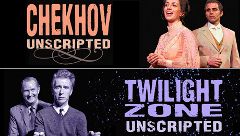CHEKHOV’S GUN, SERLING’S CIGARETTE
The most authentic and thoughtful staging of Anton Chekhov I’ve experienced in America didn’t use any Chekhov script you’ve read or seen performed or ever will see. This Impro Theatre one-night-only production of Serfs in the Field was improvised over two acts’ relaxed mastery, nimbly directed, sublimely performed, and – I want to emphasize – written all in real time, in front of a live audience. 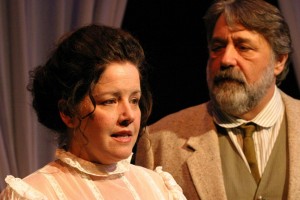 Beginning with nothing more than a setting suggested by a playgoer less than a minute before lights-up, the play (and it surely deserves the name) remained from first to last rich with symbol and theme. It understood and communicated the essence of Anton Chekhov’s oevre in a manner few outside of Eastern Europe could emulate. It featured such well-drawn characters and intricate relationships that I later begged the actors to confess that they had predetermined, if not what story to tell, at least whom each would play. The most convincing argument that their denials are true is that I wasn’t nearly as impressed with their improvisation of Twilight Zone-esqe material the night before. (The two shows are running in repertory.)
Beginning with nothing more than a setting suggested by a playgoer less than a minute before lights-up, the play (and it surely deserves the name) remained from first to last rich with symbol and theme. It understood and communicated the essence of Anton Chekhov’s oevre in a manner few outside of Eastern Europe could emulate. It featured such well-drawn characters and intricate relationships that I later begged the actors to confess that they had predetermined, if not what story to tell, at least whom each would play. The most convincing argument that their denials are true is that I wasn’t nearly as impressed with their improvisation of Twilight Zone-esqe material the night before. (The two shows are running in repertory.)
Such is the nature of improv. A traditional play may suffer from an actor’s bad night or a missed lighting cue, but give or take a flubbed line or late entrance the script will remain unchanged. An improvised play can add writing to its potential fluctuations in quality. But it must also be said, and emphatically, that good improvisation has the potential to startle and amaze to a degree uncommon in any medium.
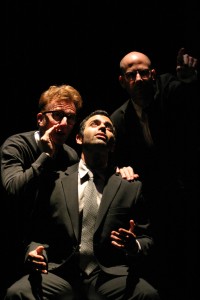 To those unfamiliar with off-the-cuff performance not centered around comedy, Impro Theatre will appear revelatory. The company owes its reserved, almost stately approach to an ethos more interested in creating literature than in telling jokes. Not that it’s not funny. Both its shows currently running at the Odyssey have a lot of laughs, but they’re in service of story and character. How many playwrights of the modern schools could benefit from this restraint? All of them.
To those unfamiliar with off-the-cuff performance not centered around comedy, Impro Theatre will appear revelatory. The company owes its reserved, almost stately approach to an ethos more interested in creating literature than in telling jokes. Not that it’s not funny. Both its shows currently running at the Odyssey have a lot of laughs, but they’re in service of story and character. How many playwrights of the modern schools could benefit from this restraint? All of them.
And how many actors could learn lessons in moment-to-moment onstage life from watching these committed players, many of whom have been working together for twenty years? Same answer. The ideal nature of an improviser is to be awake to the possibility of each circumstance. These Impro people trust each other, and they listen. They come together to collaborate, not to showboat but to assist one another in the process of art. It’s reassuring to the soul to see humans investing so fully in a concept larger than themselves.
I laughed and wept at the Chekhov – again, I’ve rarely seen a company so thoroughly comprehend the bizarre hyperreality of this writer’s universe. This is a great show for anyone who thinks he hates Chekhov, or that he’s boring or “serious.” Like any piece of art, it’s probably an even better show for someone who’s studied the source. I had a less cathartic experience with the Twilight Zone, not 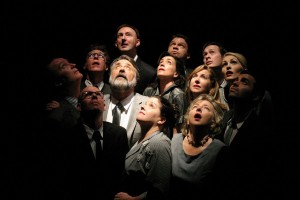 only because the practical logistics of that show (five fifteen- or twenty-minute pieces vs one hundred minutes for the Chekhov) lends itself less to total audience immersion. There’s also vastly less potential for variation and delineation in the works of Rod Serling, Charles Beaumont, and the other pulp writers who churned out Twilight Zone scripts than exists in the work of a giant like Chekhov. Doubtless, there are better nights of Twilight Zone Unscripted to be seen than the one I saw, a night in which some of the pieces meandered without apparent throughline and a couple ended without thematic (or, once, even coherent) resolution. These less successful attempts looked much like the sort of exercise one participates in for an acting class: thrilling to do, but…
only because the practical logistics of that show (five fifteen- or twenty-minute pieces vs one hundred minutes for the Chekhov) lends itself less to total audience immersion. There’s also vastly less potential for variation and delineation in the works of Rod Serling, Charles Beaumont, and the other pulp writers who churned out Twilight Zone scripts than exists in the work of a giant like Chekhov. Doubtless, there are better nights of Twilight Zone Unscripted to be seen than the one I saw, a night in which some of the pieces meandered without apparent throughline and a couple ended without thematic (or, once, even coherent) resolution. These less successful attempts looked much like the sort of exercise one participates in for an acting class: thrilling to do, but…
Much improvisation suffers from a resemblance to self-congratulatory masturbation, and Impro Theatre will always escape this label primarily due to that laudable tendency not to pander for laughs. But unevenness will dog its performances as long as it mines resources of such unequal value. This company, in its quest to make art from the air, brings to its work a meta-perspective that simultaneously invents, analyzes, praises, and riffs. 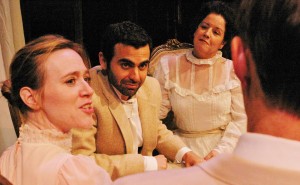 Impro Theatre has performed Shakespeare Unscripted and Jane Austen Unscripted, among others; it has steeped itself in the idiom of its source materials so thoroughly that the Chekhov’s first act ended with a well-foreshadowed yet still shocking event. The second act ended with most of the characters completing the circular arcs their natures demand, while one or two veered off in more optimistic directions. The Twilight Zones? Well, they were appropriately odd. These stories broke natural and logical law; people returned from the dead, lives thrown away were reexamined, the bad were punished and the good too, sometimes. These pieces, perhaps because they were so true to the nature of the original TV show, might have had their artistic potential limited from the start. And no doubt, Twilight Zone improv sounds like a much bigger October draw than Chekhov improv.
Impro Theatre has performed Shakespeare Unscripted and Jane Austen Unscripted, among others; it has steeped itself in the idiom of its source materials so thoroughly that the Chekhov’s first act ended with a well-foreshadowed yet still shocking event. The second act ended with most of the characters completing the circular arcs their natures demand, while one or two veered off in more optimistic directions. The Twilight Zones? Well, they were appropriately odd. These stories broke natural and logical law; people returned from the dead, lives thrown away were reexamined, the bad were punished and the good too, sometimes. These pieces, perhaps because they were so true to the nature of the original TV show, might have had their artistic potential limited from the start. And no doubt, Twilight Zone improv sounds like a much bigger October draw than Chekhov improv.
I will admit too that the Chekhov Unscripted show I saw got a softball pitch for a start: if, instead of the very traditional Chekhovian motif of “serfs working in a field,” the audience had suggested the characters be looking at “the Mars Rover sinking in a canal” or “Babe Ruth at a pie-eating contest,” I wonder whether the play would have been written and played with so deft a command. I’ll find out, because I’m seeing this as many times as I can before its run ends.
photos by Enci
Twilight Zone Unscripted
Chekhov Unscripted
Impro Theatre and Odyssey Theatre Ensemble at the Odyssey Theatre
playing in repertory through November 4, 2012
for tickets, call (310) 477-2055 or visit http://www.OdysseyTheatre.com
